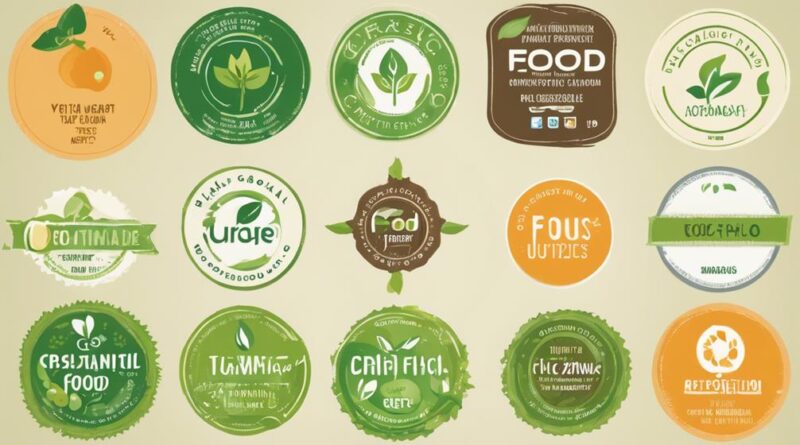Understanding Ethical Aspects of Eco-Friendly Food Labels
To grasp the ethical dimensions of eco-friendly food labels, consider organic certification as a crucial indicator of ethical sourcing and sustainable practices. It implies fair treatment for farmers and workers, yet loopholes exist. Delve into labor practices to understand their impact on ethical standards. Organic farming's environmental effects challenge traditional views, focusing on soil health and biodiversity. Transparency in labeling is key for ethical sourcing. Fair trade principles ensure environmental responsibility and fair compensation. Animal welfare and social responsibility play pivotal roles in organic agriculture. Keep exploring to deepen your understanding of these intertwining aspects.
Importance of Organic Certification
Organic certification serves as a crucial indicator of a food product's adherence to specific environmental and ethical standards. When a product is labeled as organic, it implies that the ingredients used in its production have been sourced through ethical means and grown using sustainable farming practices. Ethical sourcing ensures that farmers and workers involved in the production chain are treated fairly and compensated justly for their labor. This includes aspects such as fair wages, safe working conditions, and the absence of child labor.
Moreover, sustainable farming practices play a significant role in organic certification. By embracing sustainable farming methods, organic producers aim to minimize their environmental impact by reducing the use of synthetic pesticides and fertilizers, promoting biodiversity, and conserving water and soil quality. Sustainable farming not only benefits the environment but also contributes to the long-term viability of agricultural systems.
However, it's essential to recognize that organic certification isn't a foolproof guarantee of ethical sourcing and sustainable farming practices. While organic standards require certain criteria to be met, there have been instances of fraud and loopholes in the certification process. Therefore, consumers should remain vigilant and consider factors beyond just the organic label when making purchasing decisions to truly support ethical and sustainable practices in the food industry.
Labor Practices in Organic Farming
Transitioning from the focus on organic certification, an examination of labor practices in organic farming reveals significant implications for ethical standards within the food industry. Ethical sourcing and worker rights are crucial aspects to consider when evaluating the sustainability of organic farming.
Organic farming is often praised for its environmentally friendly practices, but little attention is sometimes given to the labor conditions of the workers involved. While organic certification ensures that certain standards are met in terms of pesticide use and soil health, it doesn't guarantee fair treatment of the labor force. This gap raises concerns about the ethical sourcing of organic products and the well-being of those responsible for their production.
Worker rights in organic farming encompass various factors such as fair wages, safe working conditions, and the right to unionize. Unfortunately, some organic farms may fall short in providing adequate protection for their workers. Issues like long hours, lack of proper safety equipment, or limited access to healthcare are violations of basic worker rights that can persist in the organic farming industry.
As consumers increasingly seek out ethically produced goods, it becomes imperative for organic farms to prioritize not only environmental sustainability but also the fair treatment of their workers. By addressing labor practices and ensuring worker rights are respected, organic farming can truly embody the values of ethical sourcing and contribute to a more socially responsible food industry.
Environmental Impact of Organic Farming
Examining the environmental impact of organic farming reveals complexities that challenge traditional perceptions of agricultural sustainability. Organic farming is often seen as a more sustainable practice than conventional farming methods. However, it's essential to critically evaluate the environmental implications of organic farming to understand its true impact on the ecosystem.
Here are four key points to consider when assessing the environmental impact of organic farming:
- Soil Health: Organic farming focuses on enhancing soil health through practices like crop rotation, composting, and the use of natural fertilizers. These practices help maintain soil structure, fertility, and biodiversity, promoting long-term sustainability.
- Reduced Chemical Inputs: Organic farming avoids the use of synthetic pesticides and fertilizers, which can have harmful effects on the environment. By minimizing chemical inputs, organic farming reduces the risk of water and soil contamination.
- Biodiversity Conservation: Organic farms often support a more diverse range of plant and animal species compared to conventional farms. This biodiversity is crucial for maintaining ecosystem resilience and promoting natural pest control.
- Carbon Sequestration: Sustainable practices in organic farming, such as cover cropping and reduced tillage, help sequester carbon in the soil. This can contribute to mitigating climate change by reducing greenhouse gas emissions and enhancing soil fertility.
Transparency in Organic Labeling
Considering the growing consumer demand for transparency in food production, evaluating the authenticity of organic labels becomes imperative in ensuring informed choices. When it comes to organic labeling, two crucial aspects must be considered: ethical sourcing and supply chain transparency.
Ethical sourcing is fundamental in organic labeling as it ensures that the products have been produced in a manner that respects both the environment and the labor involved. To verify the authenticity of organic labels, consumers should look for certifications from reputable organizations that guarantee ethical practices throughout the production process. Without such certifications, there's a risk of misleading claims that could undermine the integrity of the organic label.
Supply chain transparency is equally important in organic labeling, as it allows consumers to trace the journey of the product from farm to table. Understanding where and how the organic ingredients were sourced can provide valuable insight into the authenticity of the label. Companies that prioritize supply chain transparency demonstrate a commitment to accountability and ethical practices, which are essential for building consumer trust.
Fair Trade Principles in Organic Production
To ensure the ethical integrity of organic products, understanding and implementing fair trade principles in their production is paramount. Fair trade practices play a crucial role in ensuring that organic goods aren't only environmentally sustainable but also socially responsible.
Here are four key aspects to consider when discussing fair trade principles in organic production:
- Transparency: One of the fundamental pillars of fair trade practices is transparency in the supply chain. Organic producers must provide clear information about the origins of their products, ensuring that ethical sourcing is maintained throughout the entire process.
- Fair Pricing: Fair trade principles emphasize the importance of fair compensation for farmers and workers. Organic products should reflect this by ensuring that those involved in the production process receive a fair wage for their labor.
- Community Development: Ethical sourcing goes beyond fair wages; it also includes supporting local communities. Organic producers should engage in practices that contribute to the social and economic development of the communities in which they operate.
- Environmental Stewardship: Fair trade practices in organic production shouldn't only focus on social aspects but also on environmental sustainability. It's essential for organic producers to implement practices that minimize environmental impact and promote long-term ecological balance.
Animal Welfare in Organic Agriculture
Ensuring high standards of animal welfare is a fundamental aspect of maintaining ethical practices in organic agriculture. Animal welfare standards in organic farming dictate that animals should have access to outdoor spaces, fresh air, and be able to engage in natural behaviors. However, the reality is often far from these ideals. Many organic farms still confine animals in overcrowded spaces, limiting their movement and access to the outdoors. This discrepancy between the principles and the actual farming practices raises concerns about the true welfare of animals in organic agriculture.
Farming practices in organic agriculture can vary widely, impacting animal welfare differently. For instance, some organic farms prioritize providing ample space for animals to roam freely, while others focus more on meeting the basic requirements for certification without considering the emotional or social needs of the animals. The lack of clear, standardized guidelines on animal welfare in organic agriculture contributes to this inconsistency in farming practices.
To truly uphold ethical standards in organic agriculture, it's essential to establish and enforce rigorous animal welfare standards that prioritize the well-being of the animals. This includes not only providing for their basic needs but also ensuring that they can express natural behaviors and live a life free from unnecessary suffering. By aligning farming practices with these high standards, organic agriculture can truly embody ethical principles and promote the well-being of all living beings involved in the food production process.
Social Responsibility in Organic Supply Chains

Maintaining accountability throughout organic supply chains is crucial for upholding social responsibility in the agricultural industry. Ethical sourcing and transparent practices are essential components that ensure the well-being of workers, communities, and the environment.
Here are four critical aspects to consider when discussing social responsibility in organic supply chains:
- Worker Rights: Ethical treatment of workers within organic supply chains is paramount. Ensuring fair wages, safe working conditions, and opportunities for growth and development is crucial for upholding social responsibility.
- Community Engagement: Organic supply chains should actively engage with local communities to understand their needs and concerns. Supporting community initiatives, respecting local cultures, and fostering positive relationships are key aspects of social responsibility.
- Environmental Impact: Prioritizing sustainable practices and minimizing environmental harm throughout the supply chain is essential. From reducing carbon footprint to preserving biodiversity, organic suppliers must demonstrate a commitment to environmental stewardship.
- Supply Chain Transparency: Providing clear and accessible information about the origins of products, production processes, and certifications fosters trust among consumers. Transparency is a cornerstone of social responsibility in organic supply chains, allowing stakeholders to make informed decisions and hold companies accountable for their actions.
Consumer Awareness and Organic Choices
Consumer awareness plays a pivotal role in guiding individuals towards making informed organic choices that align with their values and beliefs. When it comes to selecting organic products, understanding the concept of ethical sourcing is crucial. By being aware of how the products are sourced, consumers can ensure that their choices support fair trade practices, environmentally friendly production methods, and the well-being of workers involved in the supply chain.
Moreover, sustainable packaging is another essential factor to consider in the realm of organic choices. Consumers should look for products that not only prioritize organic ingredients but also come in packaging that's eco-friendly and minimizes waste. Opting for items with biodegradable or recyclable packaging can significantly contribute to reducing environmental impact and promoting sustainability.
However, amidst the vast array of products labeled as organic, it can be challenging for consumers to discern which ones truly adhere to ethical sourcing and sustainable packaging practices. This is where consumer awareness comes into play. By researching brands, reading labels, and staying informed about certifications and standards, individuals can make more conscious decisions when it comes to selecting organic products that align with their values and contribute to a more sustainable future.
Conclusion
In conclusion, understanding the ethical aspects of eco-friendly food labels is crucial for making informed choices about the food we consume.
By considering factors such as organic certification, labor practices, environmental impact, transparency, fair trade principles, animal welfare, and social responsibility, consumers can support sustainable and ethical practices in the food industry.
It's important to be mindful of the impact our food choices have on the environment, society, and overall well-being.
